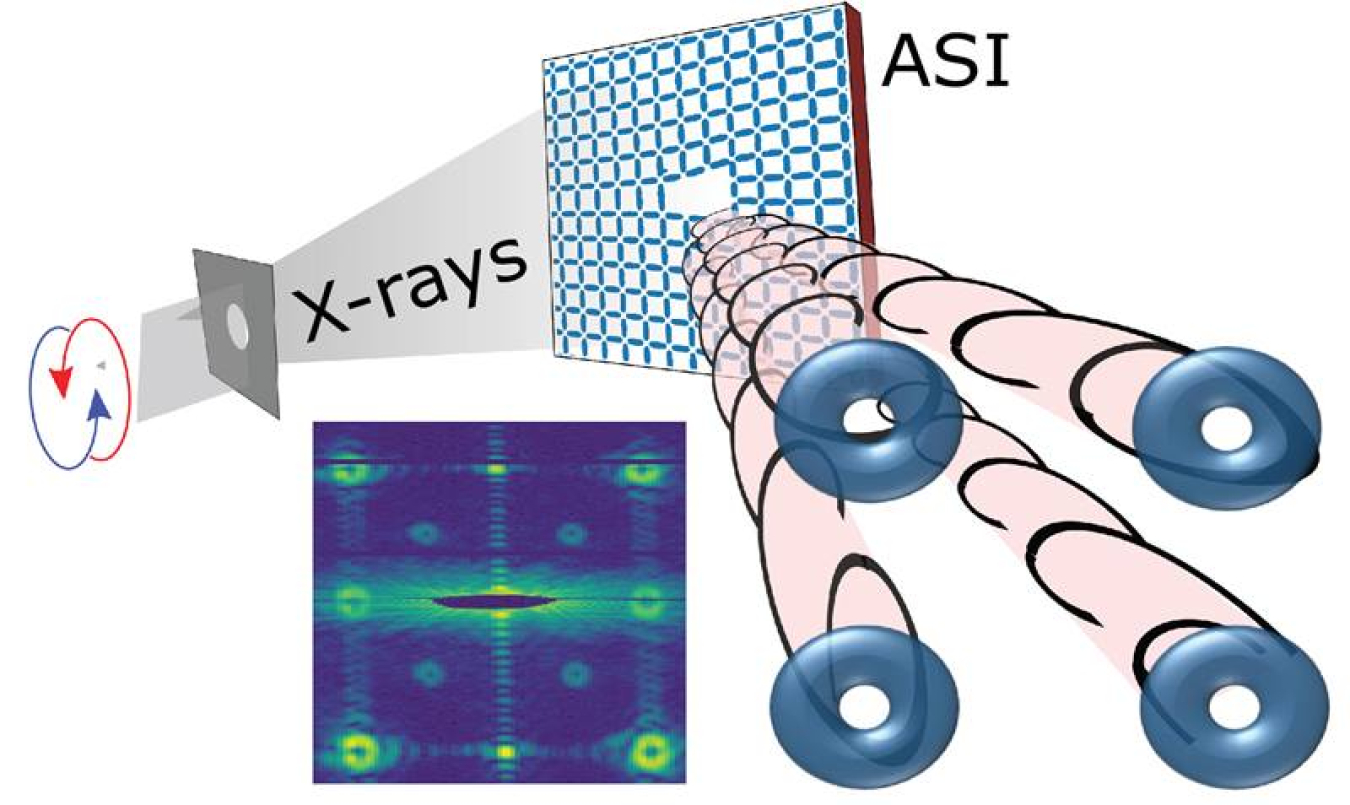
The Science
Orbital angular momentum (OAM) is the angular momentum about a chosen center of rotation. It’s an important property of the electronic structure in materials that leads to magnetism. “Twisted” X-ray beams carrying OAM hold great promise for imaging and probing materials at the nanoscale. However, these beams are hard to generate. Scientists have now developed and demonstrated a new technique that uses a special patterned array of engineered nanoscale magnets to impart OAM to X-ray beams. The beams can be switched on and off using changes in temperature and magnetic fields.
The Impact
New nanofabrication techniques have confirmed scientists’ predictions about the interaction of patterned arrays of nanomagnets. In this research, scientists examined an artificial spin crystal or spin “ice” and how it interacts with X-rays. These artificial spin ices consist of arrays of nanomagnets. Scientists can tune these magnets’ properties for different applications. The research opens the possibility of using the artificial materials as reconfigurable X-ray optics to generate and switch X-ray OAM beams. The resulting twisted beams are useful for studying magnetic materials.
Summary
The orbital angular momentum (OAM) of visible photons has found application in fields as diverse as quantum cryptography, optical tweezers, and telecommunications. Now, there is rapidly growing interest in X-ray OAM for imaging and probing materials at the nanoscale. This new research showed that X-ray diffraction from an artificial spin ice (ASI) gives rise to beams carrying OAM. The team included researchers from University of Kentucky, Argonne National Laboratory, Lawrence Berkeley National Laboratory, Brookhaven National Laboratory, and the University of California, Berkeley. The ASI considered here is based on a square lattice with an engineered defect at its center. The researchers confirmed that this structure orders antiferromagnetically near room temperature and that X-ray photons have even- and odd- OAM quantum numbers, depending on whether they scatter from the density structure or from its magnetic texture.
Finally, the researchers showed that magnetically scattered OAM beams could be turned on and off by modest variations of temperature and applied magnetic fields. These results imply reconfigurable X-ray optics can be designed using ASIs, and these structures may enable selective probing of electronic and magnetic states in materials.
Contact
J. Todd Hastings
University of Kentucky
[email protected]
Funding
The work is supported by the Department of Energy (DOE) Office of Science, Office of Basic Energy Sciences. The work used the Timepix based soft X-ray detector, development of which is supported by DOE. Two of the researchers were supported by DOE’s Nonequilibrium Magnetic Materials Program (MSMAG). This research used resources of several DOE Office of Science user facilities: the Advanced Light Source, the National Synchrotron Light Source II, and the Center for Nanoscale Materials. Sample characterization was performed in the Materials Science Division at Argonne National laboratory and supported the DOE Office of Science, Basic Energy Sciences, Materials Sciences and Engineering Division. This work was performed in part at the University of Kentucky Center for Nanoscale Science and Engineering and Center for Advanced Materials, members of the National Nanotechnology Coordinated Infrastructure, which is supported by the National Science Foundation.
Publications
Woods, J.S., et al., Switchable X-Ray Orbital Angular Momentum from an Artificial Spin Ice. Physical Review Letters 126, 117201 (2021). [DOI: 10.1103/PhysRevLett.126.117201]
Related Links
Switching the Twist in X Rays with Magnets: viewpoint article in Physics Magazine.
Scraped from https://www.sourcearu.com




